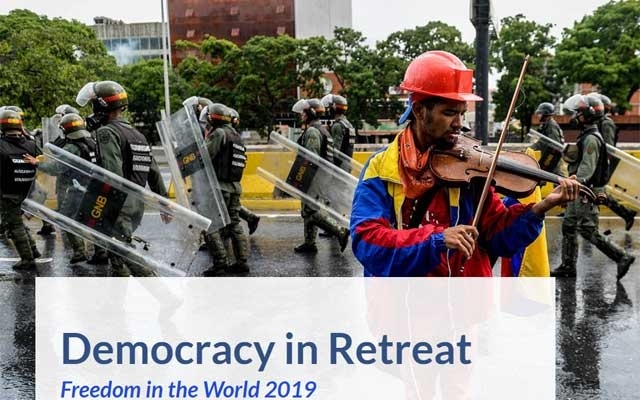‘Alarming’ decline of democracy: study

Democracy is facing an ‘alarming’ fall throughout the world as more countries move toward authoritarianism, according to an annual report by the Freedom House.
The report, titled Freedom in the World, assesses the condition of political rights and civil liberties around the world and is composed of numerical ratings for 195 countries and 14 territories. It has been published since 1973.
The report found that 2018 was the 13th consecutive year of deteriorating freedoms around the globe.
A total of 68 countries suffered a decline in political rights and civil liberties during the past 12 months, with only 50 counties registering any progress in these areas, it said.
Bangladesh has scored 41 out of 100 in aggregate freedom score and fell under the category of Partly Free. It scored 5 out of 7 in freedom rating, political rights and civil liberties.
In Bangladesh, security forces cracked down on the opposition ahead of parliamentary elections, intimidating and arresting prominent figures. The polls themselves were marked by widespread irregularities and interparty violence that resulted in more than a dozen deaths, according to the report.
The 13 years of decline have touched all parts of the world and affected Free, Partly Free, and Not Free countries alike. Every region, except Asia-Pacific, has a lower average score for 2018 than it did in 2005, and even Asia declined when countries with less than 1 million people—mostly small Pacific Island states—are excluded.
Not Free countries as a group suffered a more significant score drop than Free or Partly Free countries, which also declined, the report said.
A large number of countries that made progress in democratisation during the post-cold war era were unable to maintain it. On average, countries that earned a status upgrade—from Not Free to Partly Free, or Partly Free to Free—between 1988 and 2005 have faced an 11 percent drop in their numerical score during the 13 years of decline, the report said.
“More authoritarian powers are now banning opposition groups or jailing their leaders, dispensing with term limits, and tightening the screws on any independent media that remain,” the report said.
Experts also identified a troubling “crisis of confidence” in the US and Europe, where far-right populist forces are pushing against long-held democratic principles like the separation of powers, press freedom and the legal protection of migrants.
There has been change in the freedom status of the countries, according to the report.
Hungary’s status declined from Free to Partly Free due to sustained attacks on the country’s democratic institutions by Prime Minister Viktor Orbán’s Fidesz party, which has used its parliamentary supermajority to impose restrictions on or assert control over the opposition, the media, religious groups, academia, NGOs, the courts, asylum seekers, and the private sector since 2010.
Serbia’s status declined from Free to Partly Free due to deterioration in the conduct of elections, continued attempts by the government and allied media outlets to undermine the independent journalists through legal harassment and smear campaigns, and President Aleksandar Vu?i?’s de facto accumulation of executive powers that conflict with his constitutional role.
Nicaragua’s status declined from Partly Free to Not Free due to authorities’ brutal repression of an anti-government protest movement, which has included the arrest and imprisonment of opposition figures, intimidation and attacks against religious leaders, and violence by state forces and allied armed groups that resulted in hundreds of deaths.
Uganda’s status declined from Partly Free to Not Free as Zimbabwe’s status improved from Not Free to Partly Free.
The organisation also offered a damning assessment of the health of US democracy, noting Donald Trump’s attacks on the rule of law and fact-based journalism. The report found his government had “improperly restricted” the rights of asylum seekers and immigration policies had become “excessively harsh or haphazard”.
“The greatest danger comes from the fact that American democracy is not infinitely durable, especially if a president shows little respect for its tenets,” said Michael J Abramowitz, president of Freedom House.
“Anti-democratic rhetoric and the rejection of democratic constraints on power can be first steps towards real restrictions on freedom.”
“Challenges to democracy in the United States have outsized effects beyond American borders,” Abramowitz added. “Other nations watch what is happening in the United States and take cues from its leaders’ behaviour. The ongoing deterioration of American democracy will accelerate the decline of democracy around the world.”
Russian President Vladimir Putin and Turkish Prime Minister Recep Tayyip Erdogan were re-elected for further terms last year, while the National People’s Congress in China rubber-stamped an amendment abolishing a two-term limit on the presidency, allowing Xi Jinping indefinite rule.
A growing number of governments have reached beyond their own borders to target expatriates.
Freedom House found that 24 countries around the world – including Russia, China, Turkey, Iran, and Saudi Arabia – have targeted political dissidents abroad with practices such as extradition requests, kidnapping and assassination in the past year.
Ethnic cleansing is another growing trend, with an increase in regimes making concerted efforts to alter the ethnic composition of their territory.
The Freedom House researchers concluded liberal democracy has been in retreat for over a decade. Since 2006, a total of 116 countries have seen a decline in democratic freedoms, while only 63 countries have experienced growth.
“If the balance continues to tip towards dictatorship, the free societies that remain could find themselves isolated in a more dangerous and chaotic world,” said Sarah Repucci, a senior director at Freedom House.
A growing number of political scientists believe they have identified a strain of thought among voters that goes beyond traditional ideas of left and right; a strain that cuts across class, education, income and religiosity – even across different political cultures.
They believe understanding the concept of authoritarianism – and the authoritarian mindset of many voters – best explains the current crisis in liberal democracy.
